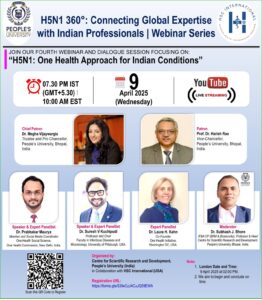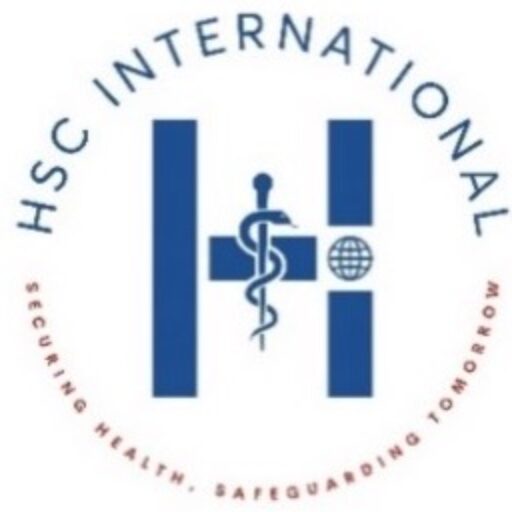
HSC International’s H5N1 360° Webinar Series successfully brought together global and local expertise to explore practical One Health strategies tailored for Indian conditions. This comprehensive session featured distinguished speakers sharing actionable insights on addressing H5N1 through integrated approaches across human, animal, and environmental health sectors.
H5N1: One Health Approach for Indian Conditions I H5N1 360° Webinar Series
Global Framework and Strategic Vision
Dr. Laura H. Kahn, Co-Founder of the One Health Initiative from the USA, provided foundational insights into the global One Health framework, emphasizing its critical importance in pandemic preparedness. Her presentation highlighted the interconnected nature of health threats and demonstrated how diseases like H5N1 require collaborative approaches that transcend traditional sectoral boundaries between human medicine, veterinary science, and environmental health.
Dr. Kahn explored successful One Health implementations worldwide, showcasing how different countries have adapted the framework to their unique circumstances while maintaining core collaborative principles. She stressed the importance of building sustainable partnerships that can respond rapidly to emerging threats while maintaining long-term surveillance and prevention capabilities.
International Perspectives and Scientific Insights
Dr. Suresh V Kuchipudi from the University of Pittsburgh offered a comprehensive global perspective on H5N1 surveillance and response strategies, drawing from his extensive research in avian influenza and international outbreak investigation experience. His presentation provided cutting-edge scientific insights into virus behavior, transmission patterns, and the evolving nature of H5N1 threats across different geographical regions.
Dr. Kuchipudi presented case studies from various global contexts, demonstrating how adaptive management approaches have successfully contained H5N1 outbreaks while building long-term resilience. He emphasized the importance of standardized protocols and communication systems that enable effective collaboration between countries with different healthcare systems and regulatory frameworks.
His scientific insights extended to the latest research on H5N1 mutations, host adaptation, and potential pandemic risks, providing participants with current understanding of the virus’s evolutionary trajectory and implications for future preparedness strategies.
Local Implementation and Indian Context
Dr. Prabhakar Maurya from India’s One Health Commission presented detailed analysis of localized strategies and the unique challenges facing India in implementing comprehensive One Health frameworks for H5N1 response. His presentation explored how global best practices can be adapted to India’s diverse geographical, economic, and social landscape.
Dr. Maurya detailed India’s National One Health Mission framework, explaining how the country is integrating human health, animal health, and environmental monitoring systems at national, state, and local levels. He discussed successful models of inter-state collaboration and highlighted the importance of community engagement and local capacity building.
The presentation addressed specific challenges of H5N1 surveillance in India’s complex agricultural landscape, where interactions between domestic poultry, wild birds, and human populations create multiple pathways for virus transmission. Dr. Maurya showcased innovative approaches that integrate traditional knowledge systems with modern surveillance technologies.
Interactive Dialogue and Strategic Insights
The session’s interactive format facilitated meaningful exchanges between participants from various sectors and countries, creating valuable dialogue that explored practical implementation challenges and innovative solutions. Key themes emerged around resource allocation, capacity building priorities, and the role of technology in supporting One Health implementation.
Participants shared experiences from their own contexts, generating substantial discussion about sustained political support for One Health initiatives, flexible funding mechanisms, and the critical role of education and training in building long-term capacity for integrated health approaches.
The webinar identified several strategic priorities, including the need for sustained investment in surveillance infrastructure that integrates human, animal, and environmental monitoring systems, and workforce development programs that prepare professionals to work effectively across traditional disciplinary boundaries.
Commitment to Continued Collaboration
This successful session reinforced HSC International’s commitment to fostering international collaboration in addressing emerging health threats through the One Health approach. The webinar demonstrated how global expertise and local knowledge can be effectively combined to develop robust, context-appropriate responses to challenges like H5N1.
The discussion highlighted the importance of sustained dialogue and knowledge sharing between global and local experts, with participants expressing strong interest in continued networking and collaboration through working groups and research initiatives.
The success of this session continues to build momentum for the H5N1 360° Webinar Series, strengthening professional networks and advancing the knowledge base that supports effective One Health implementation worldwide. HSC International remains committed to facilitating these important dialogues and supporting collaborative approaches essential for addressing current and future biosecurity challenges.

